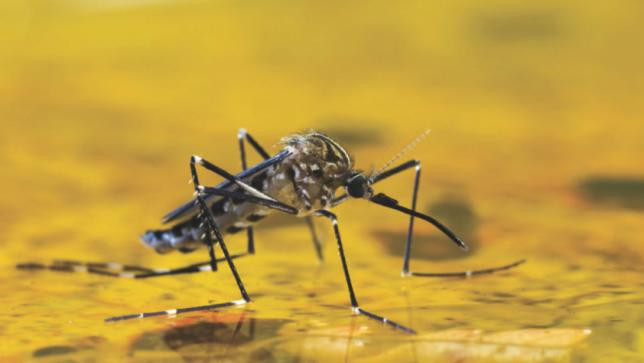In 2021, nine countries in the WHO African Region (Cameroon, Chad, Central African Republic (CAR), Côte d’Ivoire, the Democratic Republic of Congo (DRC), Ghana, Niger, Nigeria, and Republic of Congo,) reported human laboratory confirmed cases of yellow fever (YF) in areas that are at high risk for the disease and have a history of YF transmission and outbreaks. These outbreaks are growing in case numbers, necessitating an urgent response.
Since the beginning of 2021 and as of 20 December, there have been 300 probable and 88 laboratory confirmed cases of YF. Among the probable cases there have been 66 deaths reported from six countries (Ghana = 42; Cameroon = 8; Chad = 8; Nigeria = 4; Congo = 2; DRC = 2), the overall case fatality ratio (CFR) among the probable cases is 22%, with a very wide variation among countries e.g Ghana (40%) and Cameroon (21%).
In October and November 2021, confirmed active YF outbreaks were reported in Ghana and Chad respectively and required support from the International Coordinating Group (ICG) for vaccine provision from the emergency global stockpile of YF vaccine.
Among the affected countries some are classified as having a fragile, conflict-affected or vulnerable (FCV) setting, in addition to low YF population immunity. Gaps or delays in investigations of suspected YF cases due to insecurity (Chad, Cameroon, CAR) or under-served (nomadic) communities (Ghana) have implications for harm to human health and risk of onward amplification and spread.
The situation is also concerning where cases have been confirmed in inaccessible health districts with weak YF surveillance, preparedness, and response systems, and significant population displacements into neighbouring countries (e.g., Cameroon, Chad, CAR). In addition, there are major urban areas such as Abidjan, Cote d’Ivoire that have reported YF cases and are a high concern as they pose a significant risk of amplification mediated by Aedes aegypti person-mosquito-person transmission (without sylvatic intermediary). Urban YF outbreaks can rapidly amplify with onward spread internationally, as seen in Angola and DRC in 2016. The case count of confirmed and probable cases is rapidly evolving and has challenges to track due to the complexity of interpretation in the context of available epidemiological and clinical data, including vaccination history of the cases.
The overall YF vaccination coverage in these regions is not sufficient to provide herd immunity and prevent outbreaks. Estimates from WHO and UNICEF in 2020 on routine YF vaccination coverage was 44% in the African region, much lower than the 80% threshold required to confer herd immunity against YF. The national coverage in the countries of concern were all under 80% with the exception of Ghana (88%): Congo (69%), Cote D’Ivoire (69%), Niger (67%), Cameroon (57%), DRC (56%), Nigeria (54%), CAR (41%), and Chad (35%). These low YF vaccination coverages indicate the presence of an underlying susceptible population at risk of YF and a risk of continued transmission.
These outbreaks are occurring in a large geographic area in the West and Central regions of Africa. These reports signal a resurgence and intensified transmission of the YF virus. The outbreaks have included areas that have previously conducted large-scale mass vaccination campaigns but with persistent and growing gaps in immunity due to lack of sustained population immunity through routine immunization and/or secondary to population movements (newcomers without history of vaccination). For example, outbreaks were identified in late 2020 in countries with a history of nationwide preventive mass vaccination campaigns (PMVCs) including an outbreak in Guinea notified in November 2020 (history of PMVCs 2005, 2010) and Senegal notified in November 2020, (history of PMVCs 2007 plus reactive campaigns in 2011, 2005, 2002). In 2021, the recently confirmed outbreak in Ghana is marked by an impact on nomadic communities, despite the country having completed the final phase of PMVC in November 2020. Outbreaks and case reports of suspected, probable and/or confirmed cases are also occurring in other settings in the region where nationwide phased PMVCs are ongoing and yet to be completed (DRC, Nigeria), or yet to be initiated (Chad, Niger), further compounding the risk of spread.
Another potential factor contributing to the enhanced risk is a delay in the investigation of probable cases. The investigation of probable cases has faced challenges in many of the reporting countries made complicated due to stretched resources, capacity, and logistical challenges. The health systems in the nine countries with confirmed YF, in addition to the COVID-19 pandemic and COVID-19 vaccine rollout, have been strained with many other competing acute public health outbreaks which has diverted attention from YF preparedness and response activities.
The numerous YF cases and outbreaks in a broad geographic scope, with upward trend of confirmed cases and outbreaks, is indication of ongoing intense YF virus transmission in an extended area in the region and represent a persistent and growing risk to all unvaccinated people living or visiting YF high-risk countries.
Countries reporting probable but no confirmed YF case in 2021
Probable YF cases have also been reported from Benin, Burkina Faso, Gabon, Mali, Togo, and Uganda. The most recent, with samples collected during September/October, were two cases in Port-Gentil district (Ogooué-Maritime province), Gabon and two cases in Haho (Notse city) and Ogou (Atakpame city) health districts, Plateaux region, Togo. These samples are currently being shipped to the regional reference laboratories for confirmation.
WHO risk assessment
WHO encourages its Member States to take all actions necessary to keep travellers well informed of risks and preventive measures including vaccination
Yellow fever (YF) is an acute viral disease transmitted by infected mosquitoes (including Aedes sp. and Haemogogus sp). Transmission can be amplified in circumstances where the Aedes mosquitos (day feeder) are present in urban settings and densely populated areas causing a rapid spread of the disease. While many people who become infected do not experience severe symptoms, a subset will develop severe disease. Following a 3-6-day incubation period, cases develop an “acute” phase illness characterized by fever, muscle pain with a prominent backache, headache, shivers, loss of appetite, nausea and/or vomiting, which resolves within 3-4 days. Approximately 15% of cases enter a second “toxic” phase within 24 hours of initial remission, which may include high fever, jaundice with or without abdominal pain and vomiting, haemorrhage, and kidney failure, 50% of these cases die within 10 to 14 days. Vaccination is the most important means of preventing the infection.
The risk at regional level is assessed as high due to;
- the active YF virus circulation in these nine high-risk countries (countries or areas where “ YF has been reported currently or in the past, plus vectors and animal reservoirs currently exist”).
- increased population movement, including a vulnerable nomadic population that is not covered by routine immunization and undocumented border crossings with risk of spread regionally and beyond the AFRO region;
- potential risk of outbreaks in urban settings, such as Abidjan, Cote D’Ivoire or Lagos, Nigeria which are a real threat to regional and international spread;
- YF clusters located in mixed, urban and agriculture / forest territories (e.g. central Abidjan, Cote d Ivoire) highlighting the persistent risk of YF spill over into an urban area with marked cross reactivity with other circulating flaviviruses which complicates the final interpretation of laboratory results;
- the affected countries are part of the savannah region with similar ecosystems (forest and shrub land) and a variety of animals including non-human primates (monkeys), that are the primary wild hosts of the YF virus. The ecosystem is also conducive for the Aedes mosquito, which is the vector for YF, and has been involved in the savannah transmission cycle that connects the sylvatic and urban cycles of both humans and primates;
- suboptimal YF surveillance within the affected countries due to weak health systems and conflicts which delay investigation of probable cases of YF, leading to a likely underestimation of the actual number of cases and the severity of the outbreaks;
- decreased routine immunization coverages in countries with history of previous YF vaccination campaigns; with a downward trend in coverages over the last decade (72% average in 2010- 65% in 2020);
- YF preventive vaccination campaigns delayed in countries such as Nigeria, DRC or yet to be planned (Ethiopia, Chad and Niger);
- concurrent outbreaks (cholera, meningitis, malaria, circulating vaccine-derived poliovirus type 2 (cVDPV2), chikungunya, leishmaniasis, plague, Lassa fever etc) and the COVID-19 pandemic that might hamper surveillance and the response.
The overall risk at the global level is considered low, as no cases related to this current outbreak have been reported outside of the African region, at this stage. However, there are favourable ecosystems for YF outside the African region and there might be challenges in the surveillance and immunization capacities due to potential onward transmission, if not timely detected.
More than 2 billion individuals in Asia live in areas where the competent vectors A. aegypti and A. albopictus are present. The expansion of global air travel and the rapid ecological and demographic changes increase the risk of YF introductions into Asia. Based on the interconnectivity with endemic countries, studies have suggested China, India, the United Arab Emirates and Saudi Arabia are at the greatest risk of YF introduction; however, the risk of autochthonous transmission is unknown. There is a risk of outbreaks in urban settings, introduced by viraemic travellers to largely unprotected urban populations such as Lagos (Nigeria), N’Djamena (Chad) or Bangui (CAR), with continued risk of rapid amplification internationally.
The impact on public health will persist until the ongoing outbreaks are controlled, YF vaccination coverage is high and immunity gaps in the population are closed. The importation of cases to countries with suboptimal coverage and persisting population immunity gaps poses a high risk to the Region and may jeopardize the tremendous efforts invested to achieve elimination.
WHO advice
The countries reporting YF cases and outbreaks are all high priority countries for the Eliminate Yellow Fever Epidemic (EYE) strategy. These countries have introduced yellow fever vaccination into their routine immunization schedule for those aged 9 months, and also requirements of proof of vaccination against YF for all incoming travellers ≥9 months, except Chad and Nigeria, who request proof of vaccination only for travellers coming from countries with a risk of yellow fever transmission. Vaccination is the primary means for prevention and control of yellow fever. In urban centres, targeted vector control measures are also helpful to interrupt transmission. WHO and partners will continue to support local authorities to implement these interventions to control the current outbreaks.
WHO recommends vaccination against yellow fever for all international travellers 9 months of age or older going to yellow fever high risk countries. The affected countries also require a yellow fever vaccination certificate for travellers aged 9 months or over.
Yellow fever vaccines recommended by WHO are safe, highly effective and provide life-long protection against infection. In accordance with the IHR (2005), the validity of the international certificate of vaccination against yellow fever extends to the life of the person vaccinated with a WHO approved vaccine. A booster dose of approved yellow fever vaccine cannot be required of international travellers as a condition of entry.
WHO has published guiding principles for immunization activities during the COVID-19 pandemic and is currently developing specific operational guidance for conducting mass vaccination campaigns in the COVID-19 context. When conditions permit, the EYE Strategy will support rapid resumption of preventive YF activities according to WHO guidance.
WHO encourages its Member States to take all actions necessary to keep travellers well informed of risks and preventive measures including vaccination. Travellers should also be made aware of yellow fever symptoms and signs and instructed to seek rapidly medical advice when presenting signs. Viraemic returning travellers may pose a risk for the establishment of local cycles of yellow fever transmission in areas where the competent vector is present.
The updated areas at-risk for yellow fever transmission and the related recommendations for vaccination of international travellers were updated by WHO on 1 July 2020; the map of revised areas at risk and yellow fever vaccination recommendations is available on the WHO International Travel and Health website.
WHO does not recommend any restrictions on travel and trade to the region on the basis of the information available on these outbreaks.








